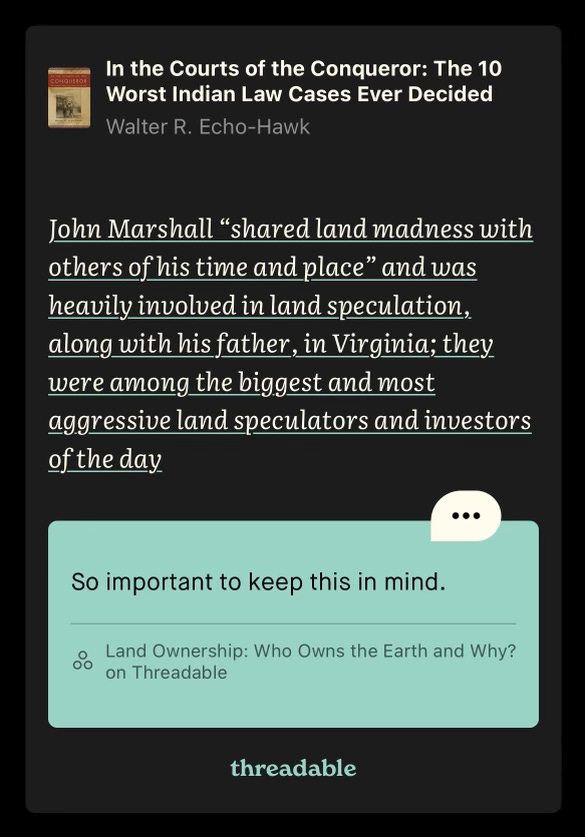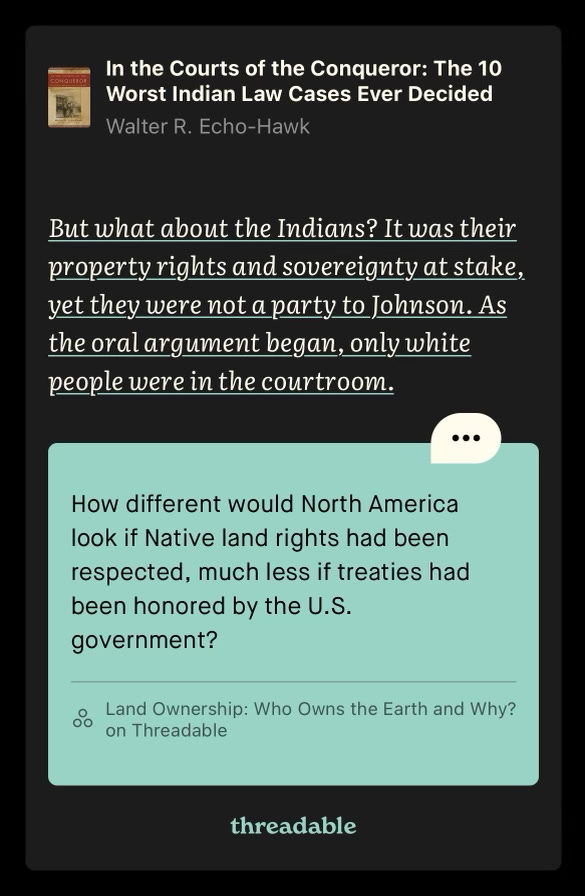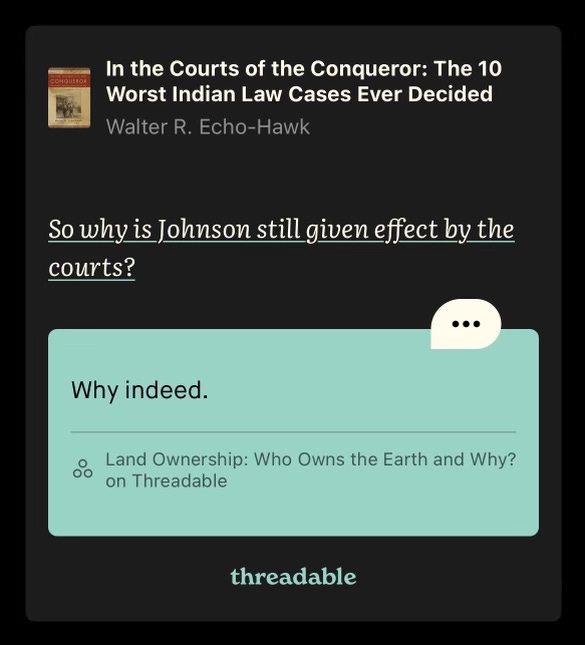Reading "In the Courts of the Conqueror: The 10 Worst Indian Law Cases Ever Decided," by Walter R. Echo-Hawk
Threadable-adjacent reading discussion on land ownership
The most recent Threadable reading* was a selection from Walter R. Echo-Hawk’s book In the Courts of the Conqueror: The 10 Worst Indian Law Cases Ever Decided: Chapter 4 on Johnson v. M’Intosh, pages 56-77, just before the section breaks.
*(https://threadablenative.page.link/Rxp8yegeZ1vXy4u19 if you want to try the Threadable app and need the link! Only works on iOS/Apple devices for now.
For anyone new to On the Commons—of which there are, um, a lot, welcome! and thank you to Terrell for recommending it on Substack Reads!—an overview of this 12-week project is here. These Substack posts are for anyone who doesn’t have iOS or doesn’t want to use Threadable but still wants to know about the readings; the subtitles are marked with “Threadable-adjacent reading discussion on land ownership.” Please feel free to comment or email me with any questions. I have also slowed the reading posts pace from once a week to once every 10-14 days.)
There is a copy of Echo-Hawk’s book on archive.org. If you don’t have an account, you can create one for free and borrow the book for one hour at a time. I apologize; I’ve been forgetting to time my own reading of these, but in general they’ve been taking me about 40-45 minutes. And if you’re interested in this subject, Echo-Hawk has an engaging writing style. Its nearly 600 pages look daunting, but the book is very accessible to read.
While the purpose of the Threadable reading circle is to dig into the phenomenon of land ownership, it was always going to end up at theft of Indigenous lands. Though I suppose it started that way in any case, as the reading from Andro Linklater’s Owning the Earth was focused on the enclosures of the commons in 15th-century Britain and the dire consequences for those who depended on that land for their survival. Anywhere that land is owned, which is pretty much everywhere, it has been taken from everyone else.
Anything that really digs into the 1823 U.S. Supreme Court case Johnson v. M’Intosh is essential reading on this subject. It is this case that made possible many of the most egregious land thefts from Native Nations in America. Not only that, but it’s been referenced as a basis for Indigenous land theft worldwide. It’s one of the most important readings because it relies on the 15th-century Doctrine of Discovery and is still used as precedent today. Justice Ruth Bader Ginsburg referenced Discovery in the 2005 case City of Sherill v. Oneida Indian Nation of New York, deciding that the Oneida Nation could no longer claim sovereignty over land it had legally purchased on the open market:
“Under the ‘doctrine of discovery,’ . . . ‘fee title to the lands occupied by Indians when the colonists arrived became vested in the sovereign—first the discovering European nation and later the original States and the United States.’”
Johnson v. M’Intosh is an incredibly convoluted case that involves generations of white people’s land speculations crossing from before the U.S.’s Revolutionary War to decades after it. Echo-Hawk covers much of the story, but if you really want to dig into the wonky details I also recommend Blake Watson’s book Buying America from the Indians, which is specifically about this case and everything leading up to it. (I wrote about Watson’s book around a year ago.)
There are two important points that Echo-Hawk highlights in this chapter: The first is that Chief Justice John Marshall, who authored the opinion in the case, was himself a well-known land speculator. He and his father owned vast tracts of land, and anything the Supreme Court decided about land ownership rights would directly affect Marshall’s own fortunes.
The second is the legal question that the case hinges on, which was, “Could white people buy land from Native Americans?” Or, to put it as Marshall viewed it, “Could Native American people own land at all?” The question being decided was whether those who had originally purchased the land from Native Americans owned it legally, or whether it was owned by people who purchased it later. But Native people, as Echo-Hawk states repeatedly, weren’t even allowed to have a stake or a say in the case.
Marshall skipped right over any of these considerations (in fact, as Echo-Hawk details, the entire case was rife with ethical shenanigans, including a straw man plaintiff and hand-picked lower-court judges—“the case was a sham,” he wrote) and went straight to what he considered, evidently, to be a self-evident truth: discovery of land translated into ownership of it. At least, it did for European people who wanted to impose their own private property systems on others. “Discovery” is mentioned several times in the 1823 decision, the most pointed instance being,
“The rights of the original inhabitants were in no instance entirely disregarded, but were necessarily to a considerable extent impaired. They were admitted to be the rightful occupants of the soil, with a legal as well as just claim to retain possession of it, and to use it according to their own discretion; but their rights to complete sovereignty as independent nations were necessarily diminished, and their power to dispose of the soil at their own will to whomsoever they pleased was denied by the original fundamental principle that discovery gave exclusive title to those who made it.
While the different nations of Europe respected the right of the natives as occupants, they asserted the ultimate dominion to be in themselves, and claimed and exercised, as a consequence of this ultimate dominion, a power to grant the soil while yet in possession of the natives. These grants have been understood by all to convey a title to the grantees, subject only to the Indian right of occupancy.”
(Emphases added.)
That is, Native Americans could live on and occupy and use land, but they could not own it. Because Europeans had “discovered” it.
The decision is made even more egregious, Echo-Hawk notes, because not even the papal decrees comprising the Doctrine of Discovery (which will be included in the next reading) nor English law at the time “entertained the notion that discovery grants title to Indian land.”
Marshall attempted further justification by stating that, “Conquest gives a title which the Courts of the conqueror cannot deny,” which Echo-Hawk notes is a “half-hearted justification,” especially given the fact that almost no—if any—North American nations were ever actually conquered.
Conflating discovery with conquering, Marshall also makes the claim that, even if the Doctrine of Discovery doesn’t have much solid justification, it had been used to create private property rights and therefore couldn’t be questioned:
“However extravagant the pretension of converting the discovery of an inhabited country into conquest may appear; if the principle has been asserted in the first instance, and afterwards sustained; if a country has been acquired and held under it; if the property of the great mass of the community originates in it, it becomes the law of the land, and cannot be questioned.”
My Threadable comment on this passage is a little long to include here, but the Post-It note in my physical copy of the book reads, “So, because a pretension led to property acquisition, you can’t question that basis. What an asshole.”
I’m reminded of a passage in Willa Cather’s novel Shadows on the Rock, in which a character tells his daughter that the law is about protection of property, not about justice. See also Season 4 of The Expanse TV show. No matter how much Johnson v. M’Intosh is buried under ponderous legal language, it comes down—as does most land ownership justification—to one thing: I took it; now it’s mine.
The important thing to remember, again, is that this case is still precedent in the U.S. and many other countries today. It is this case, and the Doctrine of Discovery behind it, that create barriers toward realizing Indigenous land rights; and in fact pervade much of our perspective about property and land ownership worldwide.
The question I’d like to leave you with is: What do we do about this? Because I don’t think “nothing” is an option, or at least it’s not one I’m willing to accept. I look at my ancestors who homesteaded in Montana 5 generations ago, and I see a lot of heart and hard work, but I do not see justice.
There are movements to overturn the Doctrine of Discovery, which you can read about through the Indigenous Values Initiative. And you can read writers like Echo-Hawk, who asks not just “Was theft of Native American lands legal,” but also why it’s still being justified today. Reading won’t fix this, but knowledge is always a good start.






" I took it; now it’s mine."
'I noticed it and I paid 24 dollars for Manhatten: now I own the entire continent. Any treaties signed are mere whimsy.'
The entire English legal system was underlaid by basic aristocratic feudalism and Declaration notwithstanding, they just imported that system into the post-Revolutionary system. Congress and the legal sytem have been cleaning up ever since.
That's the entire point of the Federalist Society: to get back to that old time feudalism - when it benefits their friends.
As to what can be done about: I haven't got the faintest. You'd need a French-style purge of the old law and a complete reset and that wouldn't fix it either.
elm
so
This song always makes me think of Johnson v M’Intosh, https://carsieblanton.bandcamp.com/track/american-kid.
The first time I read this case, in law school, of course the whole thing was just breathtakingly terrible, realizing that the foundations of property ownership in the United States came down to this. Thus cruddy, self-contradictory, illogical, inaccurate and unconvincing fiat of a decision. But I couldn’t stop rereading these passages, and they are what still play over and over in my mind:
“We will not enter into the controversy, whether agriculturists, merchants, and manufacturers, have a right, on abstract principles, to expel hunters from the territory they possess, or to contract their limits. Conquest gives a title which the Courts of the conqueror cannot deny, whatever the private and speculative opinions of individuals may be, respecting the original justice of the claim which has been successfully asserted.”
and
“However extravagant the pretension of converting the discovery of an inhabited country into conquest may appear; if the principle has been asserted in the first instance, and afterwards sustained; if a country has been acquired and held under it; if the property of the great mass of the community originates in it, it becomes the law of the land, and cannot be questioned.”
He could have just left it at the unconvincing argument of the defense, but he stops to note, that he isn’t really convinced himself, either, but, so be it, his job is to just say this is how it is and who is he to do otherwise. Did he say this because he wanted readers to know that he wasn’t so stupid as to be convinced that this decision was actually just? Or just as a sort of flex?
So anyway although legally probably what matters most about the decision is how it adopts the even more extravagant pretension of “discovery” of lands that other human beings were already living on, the part that sticks with me is how he took time to note, to make sure the reader knew: ‘We are staring the injustice of this in the face, we grasp how wrong this is under the general abstract morality we otherwise claim to believe in, but we are deciding it anyway, and we just want to make sure everyone knows that for all time.”
Which going back to the song, I think the weird threads he left there in his words are still dangling, and waiting to be picked up.